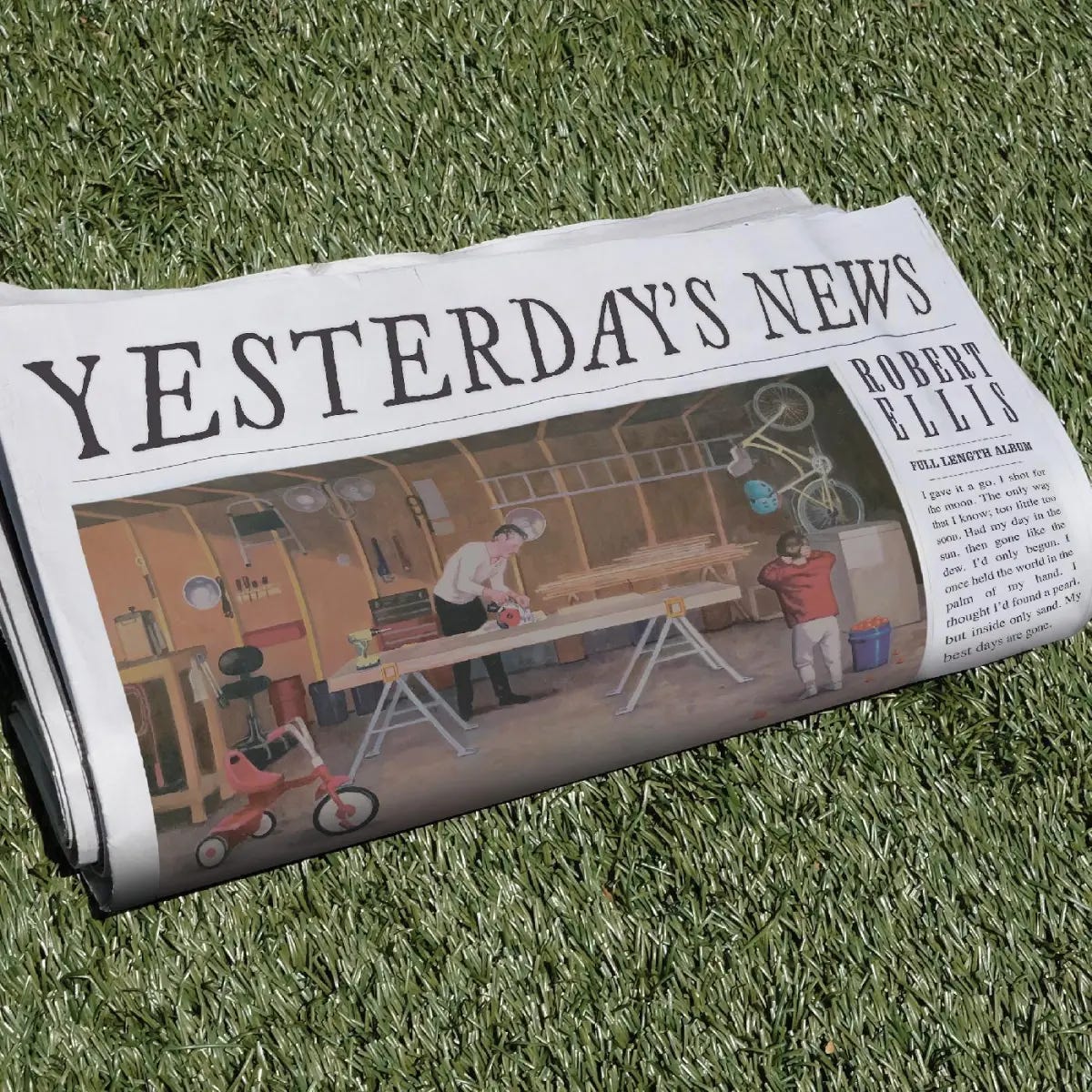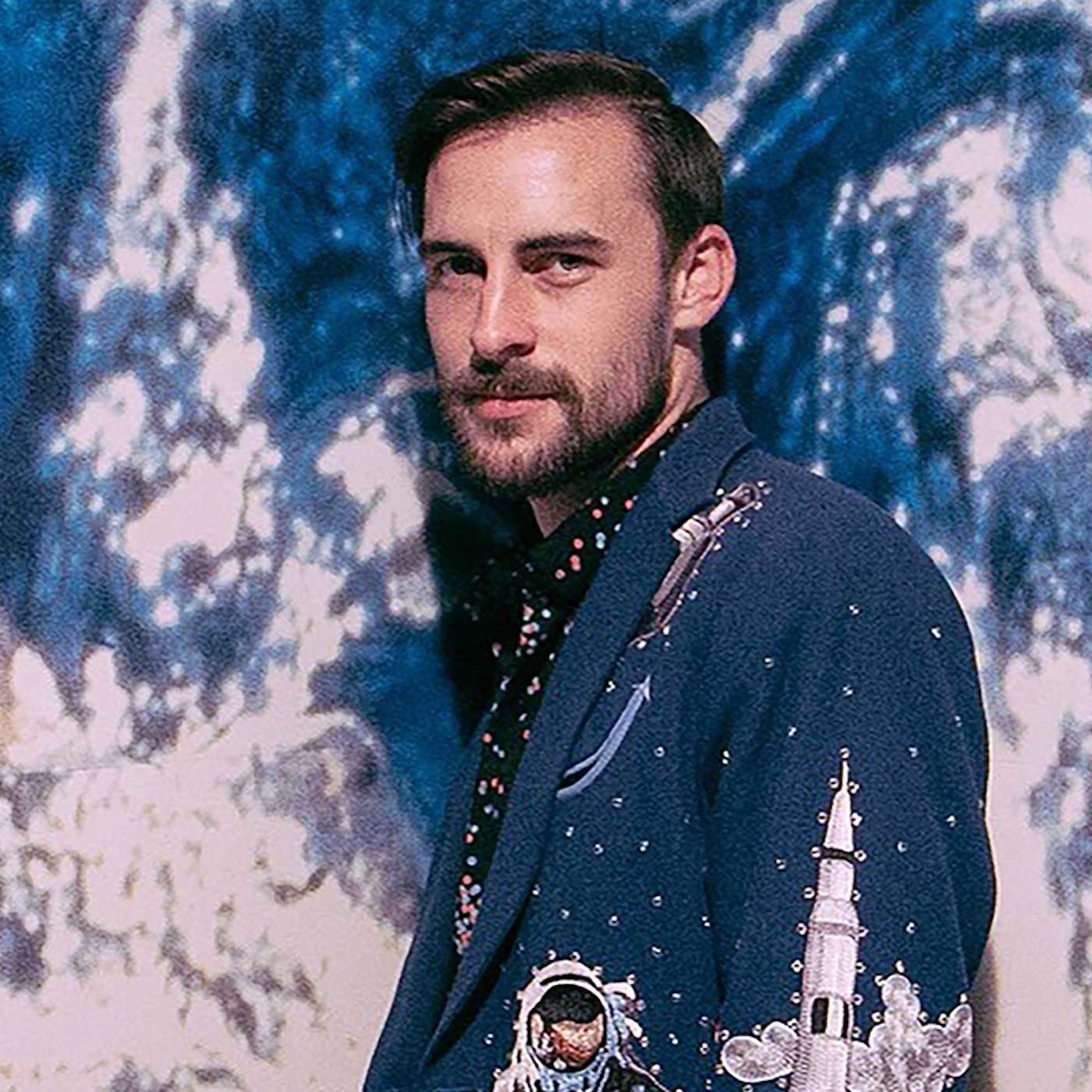Thoughts on Robert Ellis' Yesterday's News
Texas-born singer-songwriter Robert Ellis is a quintessential songwriters’ songwriter. The term is commonly used to refer to idiosyncratic, cult musical figures like John Prine, Judee Sill, and Ron Sexsmith, who count(ed) among their (unjustly-small) fandom acclaimed and popular songwriters, but that, themselves, seem(ed) destined to remain obscure, having an impact on mainstream popular culture only by proxy.
Father John Misty, otherwise known by his birth name Joshua Michael Tillman and his former affected singer-songwriter name (… ahem …) J. Tillman, has spoken candidly about resigning himself to a fate of songwriters’ songwriterdom over the course of his 8 releases under the J. Tillman moniker from 2003 to 2010. But then he took mushrooms and had a life-changing epiphany in a tree that inspired him to relaunch his career as the metafictional, lascivious FJM Jungian shadow self that became an extremely annoying—but also inarguably defining?—figure of late 2010s indie.
To my knowledge, Robert Ellis has never had a contrived shroom-fueled tree epiphany—or, at least not one that he’s felt the need to relentlessly publicize as part of an origin story—but he has put out an impressively wide-ranging catalogue since the early 2010s. 2011’s Photographs found him in classic (alt-)country mode, writing well beyond the ken of his 23 years.
Followups 2014’s The Lights from the Chemical Plant and 2016’s Robert Ellis are two of the strangest and best singer-songwriter LPs of the 2010s in my opinion, as Ellis’ writing and musicianship branch out into completely unexpected territory. On Chemical Plant, he somehow finds a way to include the epic and moody rocker “Houston,” an effortless cover of Paul Simon’s “Still Crazy After All These Years,” a ripping acoustic reflection on fire and brimstone Christianity in “Sing Along,” alongside the record’s fragile, fingerpicked closer, “Tour Song.”
The 2016 self-titled LP is even stranger and casually mind-blowing, particularly when considered in the context of generically hemmed-in/playlistified late ‘10s guitar music. Born of a singular aesthetic sensibility and burgeoning musical chops, the record has pop rockers (“How I Love You” and “Couples Skate”), a bluegrass workout (“Drivin”), orchestrally-embellished ballads (“The High Road” and “You’re Not the One”), a song that, in its beginning, kind of sounds it could be on a Jim Eno-produced Spoon album (“It’s Not Okay”), and even an ambient interlude (“Screw”).
Unfortunately, this is also probably why I’ve barely seen anyone talking about this record online in years: it was just too strange and musically omnivorous to resonate with any particular market or set of tastemakers. Even its cover art is confusing. Is it a jazz album because he looks so sharply dressed, but then it’s out on New West? Really, there’s likely no way that the musical diversity on Robert Ellis could’ve been adequately visually represented on its cover to sub-communicate to a group of consumers what exactly is contained within. I think the only reason that I even became aware of it myself was because I happened to be browsing a Rolling Stone best country albums list in the airport on the way home for Christmas in 2016—again, is it even actually a country album?!?!? who knows?—and had some significant time to kill.
In 2017, Ellis collaborated with singer-songwriter Courtney Hartman on the John Hartford tribute LP, Dear John, released by Refuge Foundation for the Arts. (Refuge, sadly, seems like it may be defunct now, because a gambling website is camping on its online presence, and its Twitter account hasn’t posted since 2018.)
I firmly believe that if Dear John had had a significant promotional push it would be acknowledged as one of the greatest tribute/cover LPs that exists. Ellis and Hartman are completely locked in throughout, performing Hartford’s music in deft acoustic fashion, their voices and guitars interweaving, teasing out the aching beauty of compositions like “Gentle On My Mind,” “Right in the Middle of Falling for You,” “Old Time River Man,” and “Delta Queen Waltz.” It is a deeply moving record that—like the best Gillian Welch and David Rawlings albums—employs its minimalist acoustic sonic palette so artfully that it feels like a self-contained world. I seem to get (re-)obsessed with it quarterly every year.
Tragically, the problem, upon release, was how hard it was to even access Dear John legally. I remember that, in order to pay money for a download of it from Canada, I actually had to make an account on Amazon.com with a fake address in St. Paul, MN, and buy it with a gift card that I sent to myself. Even to this day, I sometimes almost mistakenly order things to “Jeremy Dean” in St. Paul, MN lol.
2019’s Texas Piano Man serves as a course correction to Robert Ellis’ problem, in a sense, by clearly articulating the character that Ellis is playing on it: the Texas Piano Man. Outside of a few moments (like “Lullaby”), the mood is generally lighter than on Chemical Plant and the self-titled, and more theatrical. The influences are clearer: Elton John, Leon Russell, Nilsson, and maybe Jonathan Wilson’s 2010s production credits. There’s a fun glammy song about how “Nobody Smokes Anymore,” and another Tex-Mex one about giving up drinking for “Topo Chico” (and lime).
The album seems knowing in its constructedness, but Ellis’ writing never tips into full-on FJM-esque metafiction. Ultimately, this will probably save it, in the long run, from being frozen in amber in the mid/late ‘10s era of post-Knausgaardian(?) auto/meta-fictional male songwriting that captivated listeners, but, in the moment, it didn’t really seem to serve it critically or commercially. Where—clamoured the (wholly imagined) ironic FJM obsessive listener—was the title track where the titular Piano Man would write self-loathingly about himself and his sordid history of sexual trysts and zany drug trips in the third person for the listener to indulge in, thinking it was effortlessly bohemian but also maybe slightly cringe? Despite the album title and imagined persona, Ellis doesn’t deliver on that front. Instead, he just writes some very competent piano-based rock songs.
This all catches us up to Yesterday’s News, Ellis’ new LP that arrives on his own label (Niles City Records) with pretty awful, literal cover art after his previous 4 records with New West. Ellis’ first LP in 4 years is modest in length (9 songs in 39 minutes, including 2 instrumentals), and in promotional heft (I didn’t even know it was coming out until earlier today). The minimalist palette on this album is Ellis’ voice, his agile nylon string guitar playing, and Aden Bubeck’s double bass, recorded over 2 days. The songs are smaller and quieter as a result of Ellis contending with life as a new father.
In many ways, this is the LP that I dreamed Ellis would make at some point in his career, particularly when I felt that his ambition on previous projects was in danger of perhaps becoming ungrounded across so many different genres and moods. He has called this album “firmly rooted in folk music,” and this seems largely correct in terms of sonics. In terms of writing, however, the project ranges across folk (the stunning “Gene,” “Out of the Woods,” and “Wait”), a minor-key road ballad (“On the Run”), lovely formalist Tin Pan Alley-esque treacle (“Yesterday’s News”), and a laid-back open tuning strummer (“Better Tomorrow”). It is an album thoroughly unconcerned with trends, emerging from the double cocoons of pandemic domesticity and new parenthood.
In an interview with Variance at SXSW 2023, Ellis spoke about the new record in this way:
This record and the videos and all of it — I’m just realizing now that all of it is taking a little photograph of wherever I’m at right now and being able to look back on it 10 years from now and being like, “Oh, wow! That was a moment.” Holding onto a moment, and giving it some structure to stand on, and not forgetting about it.
This is likely the best description of Yesterday’s News. It is a patient and meditative record that gains its power from the restraint and casual beauty of its playing. I can’t wait to play it early in the morning or late in the evening in quiet moments of repose and reflection.



